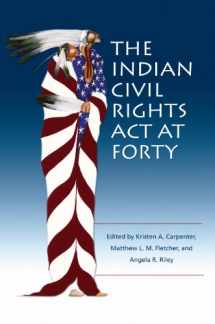
The Indian Civil Rights Act at Forty
Book details
Summary
Description
Literary Nonfiction. Native American Studies. Edited by Kristen A. Carpenter, Matthew L.M. Fletcher, and Angela R. Riley. Congress passed the Indian Civil Rights Act of 1968 (ICRA) to address civil rights in Indian country. ICRA extended select, tailored provisions of the Bill of Rights—including equal protection, due process, free speech and religious exercise, criminal procedure, and property rights—to tribal governments. But, with the exception of the writ of habeas corpus, Congress did not establish a federal enforcement mechanism for violations of the Act, nor did it abrogate tribal sovereign immunity. Thus, ICRA has been interpreted and enforced almost exclusively by Indian tribes and their courts.
This collection of essays, gathered on the fortieth anniversary of ICRA, provides for the first time a summary and critical analysis of how Indian tribes interpret and apply these important civil rights provisions in our contemporary world. The authors have found that, while informed by ICRA and the dominant society's conception of individual rights, Indian nations are ultimately adapting and interpreting ICRA in ways consistent with their own tribal traditions and beliefs. In some respects, ICRA parallels the broader experiences of tribes over the past forty years—a period of growth, revitalization, and self-determination for many Indian nations.


We would LOVE it if you could help us and other readers by reviewing the book
Book review




